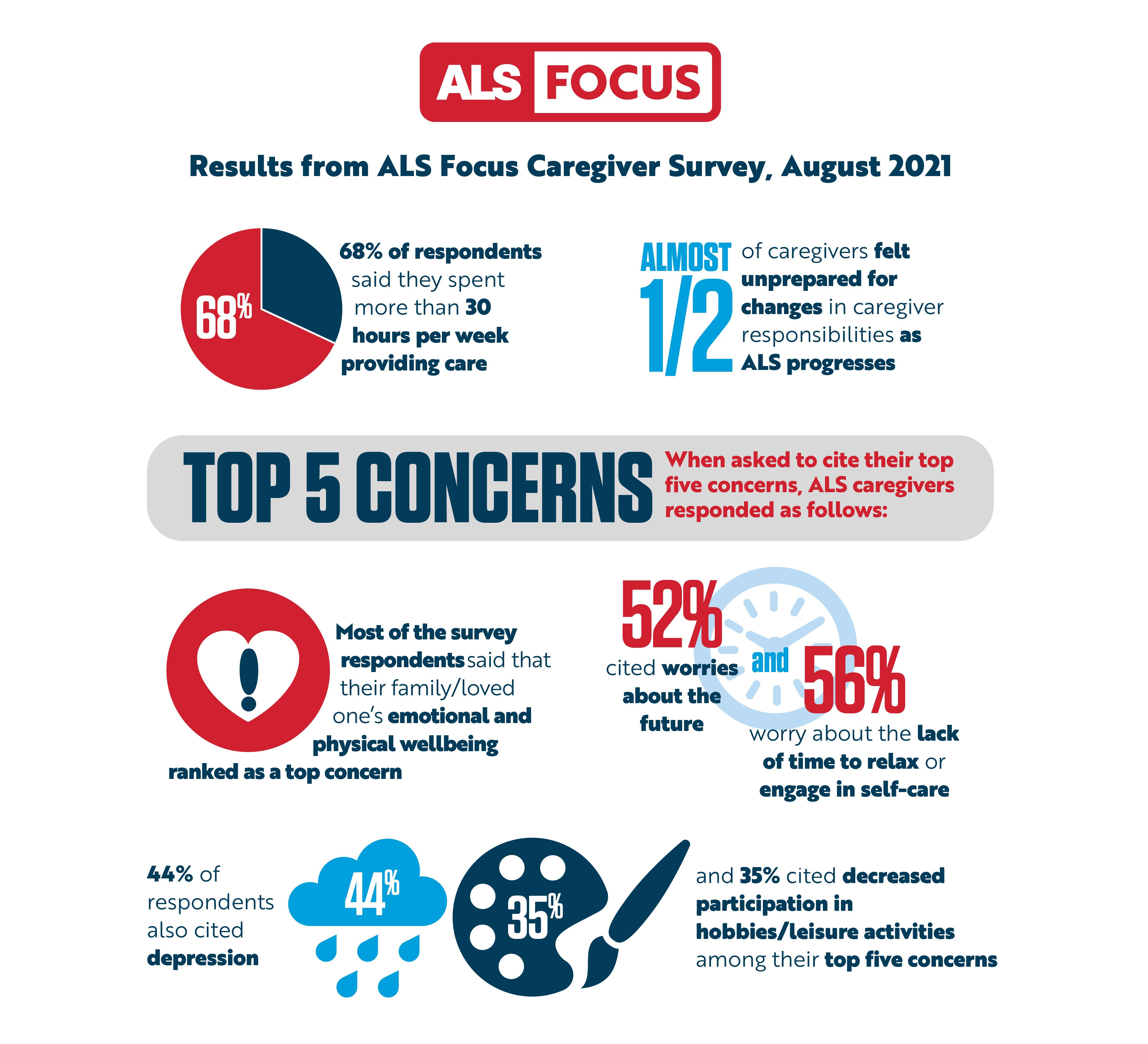Time Dedicated to Caregiving
Figure 1 shows how much time survey respondents dedicate to caregiving. Each slice represents a different amount of time per week. Most respondents, 68%, reported that they spend more than 30 hours per week giving care. 10% spend 11-20 hours per week on caregiving, 8% spent 21-30 hours per week, 7% spend less than five hours per week, and 6% spend 5-10 hours per week.
Figure 1. Number of hours dedicated to caregiving as reported by current and past caregivers.
Programs Caregivers Use and Need the Most
We presented caregivers with a list of 24 support programs and asked them if they a) use each program and b) their most needed programs.
Figure 2 shows how caregivers responded. The blue bars show what percentage of caregivers use each program. The number next to each bar indicates how each program ranked in terms of what caregivers said they need.
53% of caregivers said they benefit from home visits from nurses, occupational therapists, or physical therapists; ALS equipment loan programs; and multidisciplinary ALS clinics. 40% of caregivers benefit from palliative or hospice care services, 38% from support groups for ALS caregivers, 34% from training on general caregiving, and 29% from training on feeding tubes.
The most needed program reported was home visits, followed by general caregiving training, palliative or hospice care services, equipment loans, and lastly, multidisciplinary ALS clinics, support groups for ALS caregivers, and training on feeding tubes.
Figure 2. Programs most used and needed by ALS caregivers.
Caregiver Preparedness
Figure 3 shows how prepared current caregivers feel about taking on new caregiving responsibilities. 44% of caregivers felt somewhat prepared, 30% felt somewhat unprepared, 16% felt very unprepared, and only 9% felt very prepared.
Figure 3. How prepared caregivers feel about taking on new caregiving responsibilities.
Caregivers’ Top Concerns
Building on a previous study of ALS caregivers (Trail et al., 2004), we measured current and past caregivers’ top five concerns. Figure 4 shows the top five most common concerns among caregivers. The most common concern, at 61% of respondents, was their family and loved ones’ wellbeing. 56% of caregivers listed worries about the future as a concern, 52% were concerned about lacking time to relax or engage in self-care, 44% worried about depression, and 35% worried about participating less in enjoyable activities like hobbies.
Figure 4. The top five most common concerns reported by caregivers.
Caregivers’ Quality of Life
We asked current caregivers to rate their overall quality of life on a scale from 0 (very bad) to 10 (excellent). We based this measure on a previous survey of ALS caregivers (Pagnini et al., 2010). Figure 5 shows the results.
The height of the bar equals the percentage of caregivers who selected that number. The red bars correspond with a rating of 6-10, indicating a positive response, and the blue bars correspond with a rating of 1-5, indicating a negative response. The most common selection was 5, indicating a moderate quality of life. A majority of caregivers (61%) rated their quality life at a 6 or higher, indicating a positive quality of life. About 34% of caregivers rated their quality of life at 5 or below, indicating a negative quality of life.
Figure 5. Current caregivers’ quality of life rating.
Results Summary
The Caregiver Needs survey assessed the nature of peoples’ roles as ALS caregivers. The survey found that most caregivers dedicate at least 30 hours per week to caregiving, that they are moderately prepared for changes to their role, and that most have a positive quality of life. Their top concern was their loved ones’ wellbeing. Meanwhile, the majority said they benefit from home visits from healthcare professions, but that this is also what they need the most. Overall, the survey helped us understand what caregivers are going through and how we can best support them going forward.
We are considering subgroup analyses, such as:
- Comparing current versus past caregivers’ experiences
- Examining which programs are most needed depending on the date of diagnosis and severity of disease for the person cared for
- Examining needs and concerns among caregivers of veterans compared to non-veterans
Your Opinions Matter!
Through this research on caregiver needs and other surveys, the Association hopes to improve support programming for patients and caregivers, improve scientific research and clinical trials for people with ALS, and learn how to effectively advocate for the ALS community. Caregivers’ experience, as recorded here, shows how ALS impacts more than just the person with the condition and that taking care of someone with ALS takes a community.
Click here to take ALS Focus Surveys
Sharing the wants and needs of people with ALS and caregivers is the ultimate goal of the ALS Focus survey program.
Survey Methods
The survey took place online between January 28, 2021 – April 5, 2021. 324 current caregivers and 287 past caregivers reported their answers. The survey contained about 13 questions. This study, as part of ALS Focus, has an exemption determination from the Western Institutional Review Board.
The results presented here are not intended to represent the full population of caregivers in the United States. Instead, these results reflect the needs and experiences of those who participated in the survey.
References
Pagnini, F., Lunetta, C., Rossi, G., Banfi, P., Gorni, K., Cellotto, N., ... & Corbo, M. (2011). Existential well-being and spirituality of individuals with amyotrophic lateral sclerosis is related to psychological well-being of their caregivers. Amyotrophic Lateral Sclerosis, 12(2), 105-108.
Trail, M., Nelson, N. D., Van, J. N., Appel, S. H., & Lai, E. C. (2004). Major stressors facing patients with amyotrophic lateral sclerosis (ALS): a survey to identify their concerns and to compare with those of their caregivers. Amyotrophic Lateral Sclerosis and Other Motor Neuron Disorders, 5(1), 40-45.

